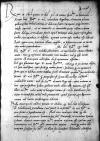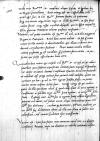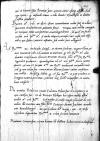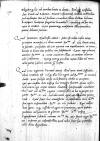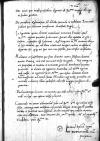Accepi litteras Reverendissimae Dominationis Vestrae admodum lugubres et maeroris plenas, quibus praesentes tribulationes et dolorem suum numquam exspectatum mihi aperuit et ut immerito ac innocenter praeter ullam culpam suam delata et traducta fuerit apud ⌊principes nostros⌋ super nescio quibus turbis, novationibus et dissidiis, quarum rerum ipsa auctor esse deberet. Petit igitur a me, iuvarem illam consilio et sustinerem eam in tanta eius animi perturbatione.
Mi Domine Reverendissime. Ego lectis litteris Reverendissimae Dominationis Vestrae indolui plurimum et non modice etiam commotus eram, non quod nescirem innocenter eam traduci, sed quod ipsa tanto maerore ob ⌊principum⌋ adversam de se opinionem afficitur.
Sed ego plurimum rogo Dominationem Vestram Reverendissimam eidemque et ex animo consulo, ut has molestias aequo fortique animo ferat iudiciumque ac opiniones suas, quae in talibus animi motibus facile obveniunt, prudentia sua moderetur. Novit Dominatio Vestra Reverendissima quam propensus est sexus ille mollior ad facile credendum omnia, sed de serenissimo domino ⌊rege⌋ nostro, cuius animum in hoc ego perspectum habeo, polliceri mihi aliter non possum, nisi quod illius maiestas adeo mitis et benignae naturae est, ut de consiliariis suis, etiam in manifestis, nihil tale pronuntiet, quod famam aut honorem eorum vel leviter perstringere deberet.
Nullo etiam pacto adduci possum, ut credam, quod dominus olim ⌊Christofforus de Schidlowiecz⌋ castellanus Cracoviensis fuerit in ea sententia de Vestra Reverendissima Dominatione, qua fuisse ei significatum est. Illud vero crederem citius, quod ⌊ille⌋ volens iuvare fortunas servitoris sui ⌊domini Plotowski⌋ in vacatione episcopatus Culmensis, dixerit coram ⌊regia maiestate⌋ eundem episcopatum esse exilem, quo benemerita Vestrae Reverendissimae Dominationis compensari possint forteque eodem illo tempore suasisse suae maiestati, ut illum suo servitori Plotowski contulisset,
 BCz, 247, p. 188
Vestram vero Reverendissimam Dominationem ampliori aliquo episcopatu et opibus hic in ⌊regno⌋ providisset. Erat namque ipse dominus ⌊castellanus Cracoviensis⌋, quod ego scio, Dominationi Vestrae Reverendissimae summus fautor et patronus.
BCz, 247, p. 188
Vestram vero Reverendissimam Dominationem ampliori aliquo episcopatu et opibus hic in ⌊regno⌋ providisset. Erat namque ipse dominus ⌊castellanus Cracoviensis⌋, quod ego scio, Dominationi Vestrae Reverendissimae summus fautor et patronus.
Atque ita iterum atque iterum rogo Dominationem Vestram Reverendissimam, ut ista forti animo ferat, neque cesset a solitis obsequiis, quae in usum ⌊reipublicae⌋ et in gloriam ⌊principum nostrorum⌋ praestare consuevit.
Nutrita vel potius enutrita est Reverendissima Dominatio Vestra in aulis magnorum regum et principum, novit bene mores aulicos et scit, quam nemo careat in illa invidiis et obtrectatoribus, qui illum cribrent, traducant et subvertere studeant. Huic autem morbo nullum certius praesentiusque est remedium, quam patienter ferre omnia, ea praesertim, quae falso adscribuntur bono viro.
Quemadmodum autem ego consulo Vestrae Reverendissimae Dominationi, ut ipsa in his adversitatibus, quas sustinet in praesentia, animum suum nequaquam despondeat. Sic censeo et ceteris dominis consiliariis ⌊istarum terrarum⌋ faciendum, ut videlicet ipsi quoque animos suos exuant omni molestia, quam conceperunt ex hoc, quod ad ⌊maiestatem regiam⌋ sinistre, falso ac praeter omnem eorum culpam delati sunt. Nemo namque est, qui credere possit de illis quidpiam aliud, quam quod credi debet de viris optimis et consiliariis ac subditis erga ⌊maiestatem suam regiam⌋ et ⌊rempublicam⌋ fidissimis. Posteaquam vero ⌊maiestas sua⌋ in ⌊regnum⌋ suum redire dignabitur, poterint vel omnes, vel saltem eorum aliqui, innocentiam suam coram maiestate sua declarare credantque firmissime, quod tum audient ex ore maiestatis suae delationem istam ab illa non solum in fidem non admissam, sed omnino habitam esse vanissimam.
Verum est sparsum fuisse eum rumorem apud nos, ut ⌊domini consiliarii Prussiae⌋ erga eos dominos et nobiles nationis nostrae,
 BCz, 247, p. 189
qui in ⌊terris istis Prussiae⌋ sunt, parum amice essent affecti, sed ego spero, quod eiusmodi rumor a solo ⌊domino Dzialinski⌋ et ⌊domino Costka⌋ prodierit.
BCz, 247, p. 189
qui in ⌊terris istis Prussiae⌋ sunt, parum amice essent affecti, sed ego spero, quod eiusmodi rumor a solo ⌊domino Dzialinski⌋ et ⌊domino Costka⌋ prodierit.
Reverendissima Dominatio Vestra, ut dixi, istam commotionem animi sui et adversariorum traductionem patienter ferat. Tempus enim multa corriget et tempore tales accusationes erunt languidiores. Id, quod ita, facile credet Vestra Reverendissima Dominatio, si modo aliquot exempla huic casui non absimilia, quae haberi possunt infinita, sub oculos suos collegerit.
Ad reverendissimum dominum archiepiscopum scripsi et iterum scribam, rogans illum, ut non revocaret sibi ad animum et iniuriam, quod Vestra Reverendissima Dominatio aliis dominis consiliariis ⌊istarum terrarum Prussiae⌋ litteras dominationis suae reverendissimae legendas praebuerit. Quandoquidem id Dominatio Vestra Reverendissima sincero animo fecerit et non, ut scripta dominationis suae reverendissimae traduceret aut publicaret, sed quod non solum suo, verum etiam illorum honori optime consultum esse vellet nihilque dubito, quod dominatio sua reverendissima, utpote prudens ac benigna natura praelatus, petitioni meae facile acquiescet et omnia boni consulet.
De ⌊domino Friderico⌋ comite palatino Rheni sum in ea opinione, in qua antehac fui, et de principe Philippo hoc ipsum metuo, quod scribit Dominatio Vestra Reverendissima, sed multis de causis magis placeret de connubio illo tractare cum ⌊filio⌋ illustrissimi principis ⌊domini Ioachimi⌋ marchionis Brandeburgensis, de quo scribam ⌊maiestati regiae⌋, quae ut mihi rescribere dignabitur, Reverendissimam Dominationem Vestram faciam certiorem.
⌊Dominum Campensem⌋, virum bonum et doctum, habeo commendatissimum
 BCz, 247, p. 190
diligiturque hic ab omnibus bonis et doctis. Praelegit epistulam ⌊divi Pauli⌋ ad Romanos. Placuit vehementer omnibus auditoribus, sed meditatur iter ad ⌊Italiam⌋, ut audiret illum doctum Hebraeum. Prosequor ⌊hominem⌋ singulari benevolentia iuvaboque ad hoc iter equo et viatico et per quamcumque occasionem illi commodare potero, libenter faciam.
BCz, 247, p. 190
diligiturque hic ab omnibus bonis et doctis. Praelegit epistulam ⌊divi Pauli⌋ ad Romanos. Placuit vehementer omnibus auditoribus, sed meditatur iter ad ⌊Italiam⌋, ut audiret illum doctum Hebraeum. Prosequor ⌊hominem⌋ singulari benevolentia iuvaboque ad hoc iter equo et viatico et per quamcumque occasionem illi commodare potero, libenter faciam.
Quod ⌊dominum Dzialinski⌋ attinet, satis est nobis tales viros privatim monuisse, ut illum monuit Reverendissima Dominatio Vestra litteris amicis et secretis, praesertim ubi vir uxorem non repudiaverit et concubinam in locum eius publice non substituerit. Quare rogo plurimum Vestram Reverendissimam Dominationem, curet amicitiam ⌊illius⌋ et omnium aliorum sibi conservare. Quisque namque prudens cupere debet vel ranunculos potius habere amicos quam hostes.
Quod vero negotium Varmiense attinet, illud nunc novis difficultatibus irretitum est, idque illis litteris regiis ad reverendissimum ⌊dominum Varmiensem⌋ datis, quas scripsit mihi molestissimo animo se accepisse, quae quo consilio datae missaeque hoc tempore fuerint, plane nescio. Sed tamen ego nuper mittens dominum ⌊Maczieowski⌋ canonicum ecclesiae meae ad ⌊maiestatem regiam⌋, commisi illi, ut hoc negotium pro parte Reverendissimae Dominationis Vestrae, sed alio modo, agat et diligenter promoveat. Quid super hac commissione et postulatione mea ⌊maiestas sua regia⌋ respondebit, Reverendissimae Dominationi Vestrae scribam. Ego adhuc bene spero neque cessabo id agere et promovere, quod putabo pertinere ad honorem et gloriam Reverendissimae Dominationis Vestrae. Cognoscemus subinde animum ⌊maiestatis suae⌋, quo fuerit erga Reverendissimam Dominationem Vestram ex responso illius, quod nobis super hac petitione nostra dare dignabitur.
 BCz, 247, p. 191
BCz, 247, p. 191
De novis, quae mihi perscribere dignata est Reverendissima Dominatio Vestra superinscribed, in the hand of sender⌈Dominatio VestraDominatio Vestra superinscribed, in the hand of sender⌉ magnas illi ago et habeo gratias.
De provisione ⌊Gdanensium⌋ et delectu faciendo in nobilitate ⌊Pomeraniae⌋ scribam per idoneam occasionem ⌊maiestati regiae⌋.
In legatione, quam ⌊domini consiliarii terrarum Prussiae⌋ apud ⌊maiestatem regiam⌋ proxime habuerunt, speravi illos optatum et gratiosum responsum esse habituros. Quod itaque ⌊sua maiestas⌋ oratores ⌊illorum⌋ in his omnibus, quae ad illam retulerant, benigne audire et absolvere dignata est, quodque me spes mea non fefellit, sum mirifice consolatus.
Molimina et hostilitates, quae strui dicuntur contra illustrem dominum ⌊ducem Prussiae⌋, iam ante non erant mihi incognitae. Fuit namque ea res proposita et tractata in ⌊conventu generali Piotrkoviensi⌋ proxime praeterito et datum est negotium oratoribus ad ⌊maiestatem regiam⌋ inde missis, ut rogarent suam maiestatem, quo ipsum ⌊dominum ducem⌋ litteris necessariis ad omnes status et ordines ⌊Germaniae⌋ providere et arcendis a ditione illius quibusvis adversis benigne prospicere dignaretur.
Declamationem Luciani et carmina, quae misit ad me Vestra Reverendissima Dominatio, vidi ac legi, quae optime mihi placent.
Commendo me amori et benevolentiae fraternae Vestrae Reverendissimae Dominationis, quae valeat et sit felix omnemque animi molestiam a se prorsus abigat, nam ego illi omnibus viribus et facultate mea assistam et eam numquam ope, consilio et patrocinio meo destituam.
 BCz, 247, p. 188
Vestram vero Reverendissimam Dominationem ampliori aliquo episcopatu et opibus hic in
BCz, 247, p. 188
Vestram vero Reverendissimam Dominationem ampliori aliquo episcopatu et opibus hic in  BCz, 247, p. 189
qui in
BCz, 247, p. 189
qui in  BCz, 247, p. 190
diligiturque hic ab omnibus bonis et doctis. Praelegit epistulam
BCz, 247, p. 190
diligiturque hic ab omnibus bonis et doctis. Praelegit epistulam 